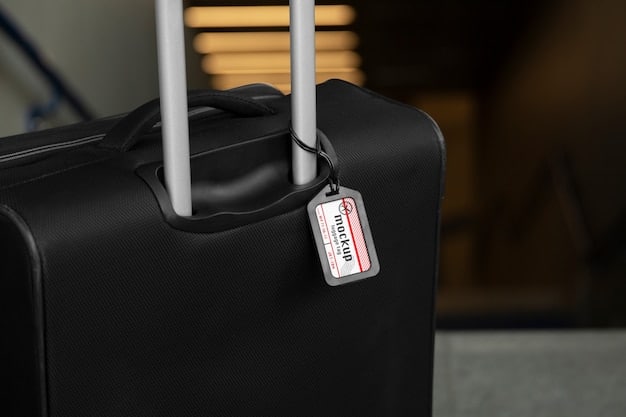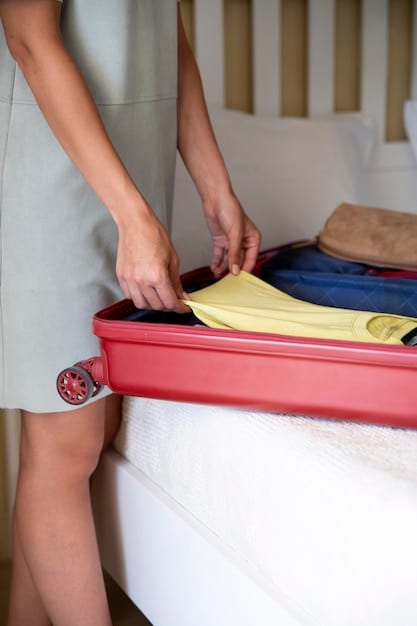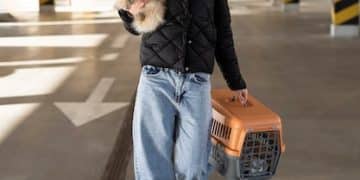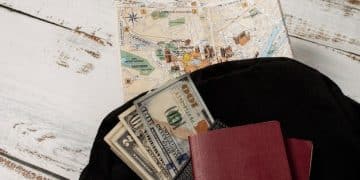US Airlines Baggage Fees in 2025: What to Expect

As US airlines update their baggage fee policies for 2025, travelers need to be aware of potential changes in costs for checked bags, including variations based on airline, destination, and frequent flyer status.
Planning to fly in 2025? You’ll want to stay informed about the latest updates to US Airlines Update Baggage Fee Policies: What You’ll Pay in 2025. Airlines frequently adjust their fees, and understanding these changes can save you money and stress.
Understanding the Basics of US Airline Baggage Fees
Navigating airline baggage fees can feel like a maze. Each airline has its own set of rules, and these rules can change frequently. So, what are the fundamental aspects you need to understand about baggage fees on US airlines?
Baggage fees are charges levied by airlines for checked baggage. These fees can vary widely depending on several factors, including the airline, the destination, the weight and size of the bag, and your frequent flyer status. Some airlines also offer waivers or discounts on baggage fees for certain credit card holders.

Factors Influencing Baggage Fees
Several elements play a role in determining how much you’ll pay to check your bag. Understanding these can help you make informed decisions about your luggage.
- Airline: Different airlines have different fee structures. Budget carriers often charge more for baggage than legacy airlines.
- Destination: Fees for international flights may differ from domestic flights, often with different weight and size restrictions.
- Weight and Size: Bags exceeding specified weight and size limits incur additional charges.
- Frequent Flyer Status: Elite members of frequent flyer programs often receive complimentary checked baggage.
Staying informed about these factors can help you minimize costs and make your travel experience smoother.
In conclusion, a basic understanding of baggage fees involves knowing the airline’s policies, the destination’s impact, and the weight/size restrictions. Frequent flyer status can also play a significant role in reducing or waiving these fees.
Key US Airlines and Their Baggage Fee Policies for 2025
Let’s dive into the specifics of some major US airlines and their baggage fee policies expected for 2025. This will give you a clearer picture of what to expect from each carrier.
We’ll examine airlines like Delta, United, American, Southwest, and JetBlue. Each has unique approaches to baggage fees, influenced by factors such as route, class of service, and loyalty programs.
Delta Air Lines
Delta Air Lines typically charges around $30 for the first checked bag and $40 for the second on domestic routes. These fees can be higher for international flights. Delta SkyMiles Medallion members often receive free checked bags.
United Airlines
Like Delta, United Airlines generally imposes a $30 fee for the first checked bag and $40 for the second on domestic flights. Premier members and certain United credit card holders may be exempt from these fees.
American Airlines
American Airlines mirrors Delta and United with similar fees, around $30 for the first checked bag and $40 for the second on domestic routes. AAdvantage elite members and eligible credit card holders can avoid these fees.
Southwest Airlines
Southwest is known for its customer-friendly baggage policy, allowing two free checked bags for all passengers. This sets it apart from its competitors and can be a significant advantage for travelers.
JetBlue
JetBlue’s baggage fees vary depending on the route and fare type. On many domestic routes, the first checked bag is around $30-$35, and the second is $45. Passengers on Blue Basic fares often face higher fees or no free allowance.
Looking ahead to 2025, staying updated with each airline’s specific policies can help you anticipate costs and choose the best option for your travel needs. Checking directly with the airline before your flight is always recommended.
Strategies to Avoid Baggage Fees
Want to avoid those pesky baggage fees? There are several strategies you can employ to save money and travel smarter.
One common approach is to pack light and use only a carry-on bag. Another is to leverage airline credit cards or frequent flyer status. Shipping your luggage or using baggage delivery services are also viable options.

Packing Light and Smart
The simplest way to avoid baggage fees is to travel with only a carry-on. This requires careful planning and efficient packing.
- Plan Your Wardrobe: Choose versatile clothing items that can be mixed and matched.
- Use Packing Cubes: These help compress clothes and keep your bag organized.
- Roll Your Clothes: Rolling saves more space than folding.
- Utilize Travel-Sized Toiletries: These save space and comply with airline regulations.
Leveraging Credit Cards and Loyalty Programs
Many airline credit cards and loyalty programs offer free checked bags as a perk.
- Airline Credit Cards: Some cards offer a free checked bag for you and travel companions on the same reservation.
- Frequent Flyer Status: Elite status often includes complimentary checked bags.
- Check for Promotions: Airlines occasionally run promotions offering reduced or waived baggage fees.
By using these strategies, you can often avoid baggage fees and reduce the overall cost of your trip. Careful planning and strategic choices can make a big difference.
In summary, avoiding baggage fees often involves packing light, taking advantage of credit card perks, or utilizing loyalty programs. These strategies, when combined, can significantly cut down on travel expenses.
The Impact of Baggage Fees on Travel Behavior
Baggage fees have significantly influenced how people travel. The added costs have prompted many travelers to change their packing habits and airline choices.
Travelers now often prioritize carry-on luggage and may even choose airlines with more lenient baggage policies. This has led to both positive and negative impacts on the travel experience.
Shifts in Packing Habits
The imposition of baggage fees has led to a noticeable shift in how travelers pack for their trips.
- Carry-On Optimization: More travelers are maximizing their carry-on allowance and minimizing checked baggage.
- Clothing Choices: Passengers are more selective about the clothes they pack, opting for versatile items.
- Shopping at Destination: Some travelers choose to purchase necessities at their destination rather than pack them.
The Ripple Effect on Airline Choices
Airlines’ baggage fee policies can significantly influence which carrier a traveler chooses.
- Price Comparison: Travelers often compare the total cost, including baggage fees, before booking a flight.
- Loyalty to Baggage-Friendly Airlines: Some customers stick with airlines like Southwest that offer free checked bags.
- Use of Budget Airlines: While budget airlines may have lower base fares, their baggage fees can add up quickly.
Overall, baggage fees have reshaped travel behavior, leading to more strategic packing and airline selection practices. These changes reflect a growing awareness of the added costs associated with checked luggage.
In conclusion, baggage fees have driven substantial changes in travel behavior, affecting both packing habits and airline loyalty, as passengers seek ways to minimize these extra costs.
Future Trends in Airline Baggage Fees
Looking ahead, what can we expect from airline baggage fees? Several trends are emerging that could shape the future of these charges.
Expect to see more dynamic pricing, personalized fee structures, and technological innovations aimed at streamlining baggage handling. These trends could further impact the travel experience and costs.
Dynamic Pricing Models
Airlines are increasingly adopting dynamic pricing models for baggage fees.
- Demand-Based Pricing: Fees may fluctuate based on flight demand and time of booking.
- Route-Specific Fees: Fees could vary more widely depending on the route and its popularity.
- Personalized Offers: Airlines may use customer data to offer personalized baggage fee discounts or waivers.
Technological Innovations
Technology is expected to play a bigger role in baggage handling and fee management.
- Self-Service Bag Drop: More airports may implement self-service bag drop systems to reduce costs and improve efficiency.
- Real-Time Tracking: Enhanced tracking systems can provide passengers with better visibility of their luggage.
- Mobile Payment Options: Airlines may offer more convenient mobile payment options for baggage fees.
These future trends indicate that baggage fees will likely become more flexible and technologically integrated, impacting how travelers plan and pay for their luggage.
In conclusion, the future of airline baggage fees points toward dynamic pricing influenced by demand and personalized offers, as well as technological advancements aimed at optimizing baggage handling processes.
Tips for Staying Updated on Baggage Fee Policies
Staying informed about the latest baggage fee policies is crucial for any traveler. Here are some practical tips to help you keep up-to-date.
Regularly check airline websites, use travel apps, and follow travel news sources. Engaging with airline social media can also provide timely updates.
Checking Airline Websites
The most reliable source of information is the airline’s official website.
- Baggage Fee Pages: Look for dedicated pages outlining baggage allowances and fees.
- Terms and Conditions: Review the fine print for any changes or exceptions.
- FAQ Sections: Consult the FAQ for common questions and answers about baggage policies.
Leveraging Travel Apps and Resources
Several travel apps and websites offer up-to-date information on baggage fees.
- Baggage Fee Calculators: Use online tools to estimate baggage fees for different airlines and routes.
- Travel News Sites: Follow reliable travel news sources for the latest updates on airline policies.
- Airline Social Media: Monitor airline accounts on social media for announcements and promotions.
By following these tips, you can stay well-informed about baggage fee policies and avoid surprises during your travels. Continuous monitoring is key to saving money and ensuring a smooth travel experience.
To summarize, you can stay updated on baggage fee policies by regularly checking airline websites, using travel apps and resources, and following travel news and airline social media accounts.
| Key Point | Brief Description |
|---|---|
| 💰 Baggage Fees | Airlines charge for checked bags, varying by airline, destination, and weight. |
| ✈️ Airline Policies | Delta, United, American charge ~$30 for the first bag; Southwest allows two free bags. |
| 🧳 Avoid Fees | Pack light, use airline credit cards, or leverage frequent flyer status to waive fees. |
| 📱 Stay Updated | Check airline websites and use travel apps to stay informed about policy changes. |
Frequently Asked Questions (FAQ)
▼
Most major US airlines, like Delta, United, and American, charge around $30 for the first checked bag and $40 for the second on domestic routes, though this can vary by destination and specific policy updates.
▼
Southwest Airlines is unique in offering two free checked bags to all passengers, which sets it apart from other major US carriers that typically charge for checked baggage.
▼
You can avoid baggage fees by packing light and using only a carry-on, using airline credit cards that offer free checked bags, or attaining elite status in an airline’s frequent flyer program.
▼
Yes, baggage fees for international flights are often higher than those for domestic routes, and the weight and size restrictions may also differ, so it’s important to check with the airline beforehand.
▼
The most reliable sources are the official websites of the airlines and reputable travel apps. You can also stay informed by following travel news sources and the airlines’ social media accounts for the latest updates.
Conclusion
Staying informed about US Airlines Update Baggage Fee Policies: What You’ll Pay in 2025 is crucial for cost-effective travel planning. By understanding the fees, employing strategies to avoid them, and keeping up with the latest updates, you can navigate the complexities of airline travel with confidence and potentially save a significant amount of money, ensuring a smoother and more budget-friendly journey.





